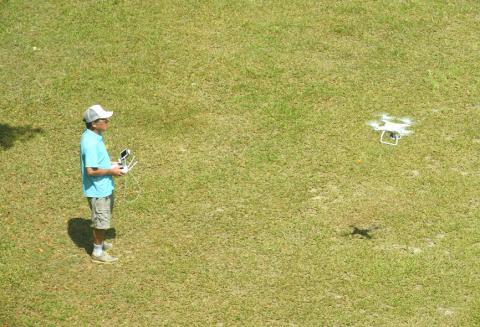The Taichung City Government is planning to ban drones in two public areas — the Calligraphy Greenway and Citizen Plaza — later this month in a bid to prevent injury from drone collisions or malfunctioning machines.
The city’s Construction Bureau said that as the devices are growing in popularity and more people are using them in public spaces during holidays, there is a risk to people and property from drones colliding and crashing to the ground.
Residents in buildings around the plaza and greenway have expressed concern about the camera-equipped devices encroaching on their privacy, the bureau said.

Photo: Chang Chia-ming, Taipei
There is also the risk of signal interference as drone usage grows, causing loss of control over the devices and potential accidents, the bureau added.
It cited as examples a drone crashing into the Taipei 101 skyscraper in July last year; a drone falling and injuring a woman at Sun Moon Lake in June; and another one crashing into the High Speed Rail tracks in Hsinchu.
“Using drones can be dangerous and there is still no government agency tasked with regulating their usage. This is especially problematic given that the machines can be purchased online for as little as NT$50,000 to NT$60,000. The low cost of drones means that they can now be seen flying everywhere, spreading with no resistance,” said a bureau official, who declined to be named.
The bureau said that public safety and environmental protection are its main concerns, and it aims to prevent an incident before one occurs.
It added that in accordance with public interests, it will invoke Item 11.2 of Clause 99 of the Civil Aviation Act (民航法) to prohibit the operation of drones in prohibited and restricted areas.
Calligraphy Greenway and Citizen Plaza will be designated as two of these restricted areas under the city’s park ordinance, the bureau said, adding that signs will be posted and an announcement made before the new restrictions take effect later this month.
No exact date was given.

Alain Robert, known as the "French Spider-Man," praised Alex Honnold as exceptionally well-prepared after the US climber completed a free solo ascent of Taipei 101 yesterday. Robert said Honnold's ascent of the 508m-tall skyscraper in just more than one-and-a-half hours without using safety ropes or equipment was a remarkable achievement. "This is my life," he said in an interview conducted in French, adding that he liked the feeling of being "on the edge of danger." The 63-year-old Frenchman climbed Taipei 101 using ropes in December 2004, taking about four hours to reach the top. On a one-to-10 scale of difficulty, Robert said Taipei 101

Nipah virus infection is to be officially listed as a category 5 notifiable infectious disease in Taiwan in March, while clinical treatment guidelines are being formulated, the Centers for Disease Control (CDC) said yesterday. With Nipah infections being reported in other countries and considering its relatively high fatality rate, the centers on Jan. 16 announced that it would be listed as a notifiable infectious disease to bolster the nation’s systematic early warning system and increase public awareness, the CDC said. Bangladesh reported four fatal cases last year in separate districts, with three linked to raw date palm sap consumption, CDC Epidemic Intelligence

Taiwanese and US defense groups are collaborating to introduce deployable, semi-autonomous manufacturing systems for drones and components in a boost to the nation’s supply chain resilience. Taiwan’s G-Tech Optroelectronics Corp subsidiary GTOC and the US’ Aerkomm Inc on Friday announced an agreement with fellow US-based Firestorm Lab to adopt the latter’s xCell, a technology featuring 3D printers fitted in 6.1m container units. The systems enable aerial platforms and parts to be produced in high volumes from dispersed nodes capable of rapid redeployment, to minimize the risk of enemy strikes and to meet field requirements, they said. Firestorm chief technology officer Ian Muceus said

MORE FALL: An investigation into one of Xi’s key cronies, part of a broader ‘anti-corruption’ drive, indicates that he might have a deep distrust in the military, an expert said China’s latest military purge underscores systemic risks in its shift from collective leadership to sole rule under Chinese President Xi Jinping (習近平), and could disrupt its chain of command and military capabilities, a national security official said yesterday. If decisionmaking within the Chinese Communist Party has become “irrational” under one-man rule, the Taiwan Strait and the regional situation must be approached with extreme caution, given unforeseen risks, they added. The anonymous official made the remarks as China’s Central Military Commission Vice Chairman Zhang Youxia (張又俠) and Joint Staff Department Chief of Staff Liu Zhenli (劉振立) were reportedly being investigated for suspected “serious